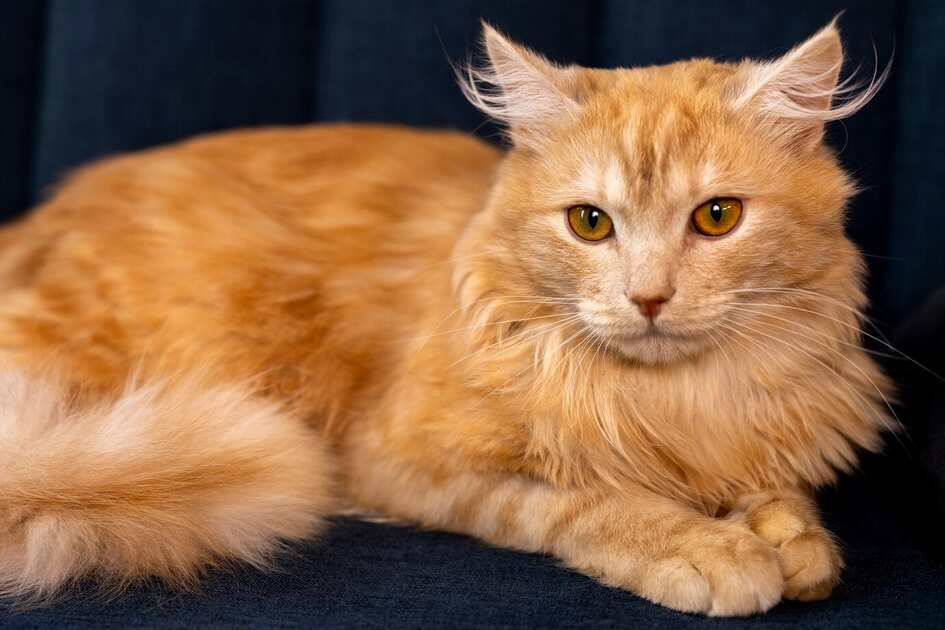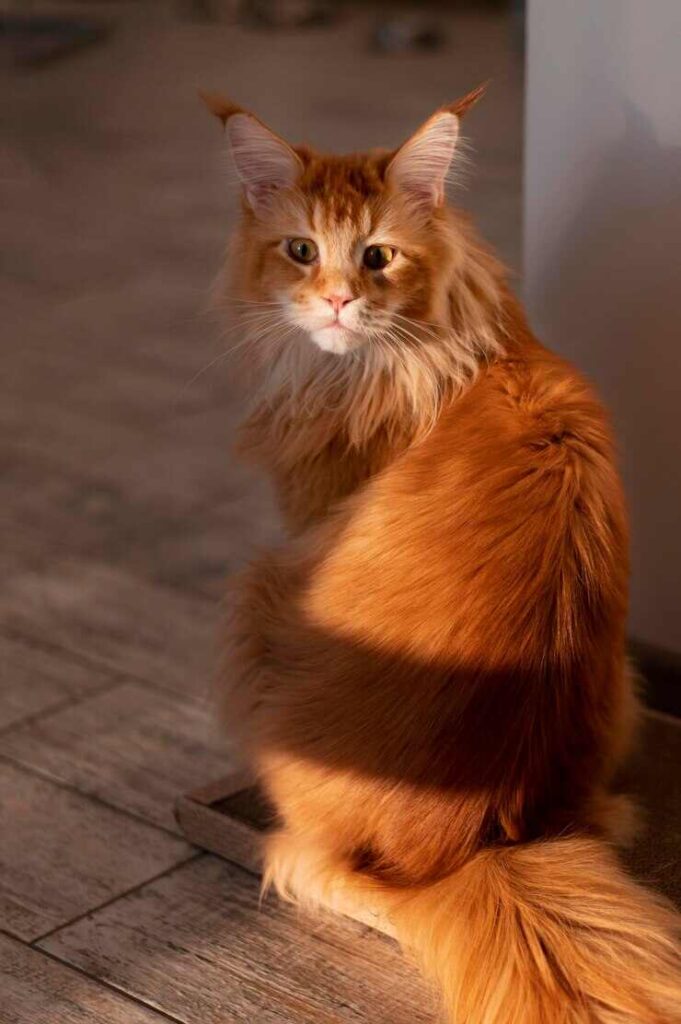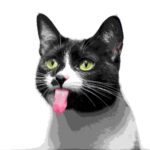
The Orange Maine Coon cat is a stand-out breed that has captured the attention of many cat lovers. These gentle giants with their furry coats and loving personality are considered one of the most fancied cat breeds all over the world. Combine that with an eye-popping orange or red color, and you have a loving cat who is great to look at as well.
In this article, we focus on the wonderful world of the Orange Maine Coon cat — examining its history, traits and qualities, personality types as well as grooming needs. If you are looking for information on this amazing breed, whether you have one or not already this is the guide and knowledge base that will deliver what insights that each owner would need.
History And Background Of Maine Coon Cats
An oblique origin tale of the Maine Coon cat The breed has been known in North America since at least the mid-19th century, and was a well-established variety by World War I. Originating from New England — particularly Vermont, Rhode Island, and Maine — where it is now the official state cat. Whereas its origin is subject to numerous legends, one of the more believable is that Maine Coons are related to domestic cats that sailors boated along with them from Europe in 18th century America. Maine Coons developed from interbreeding of these cats with local short-haired breeds over time into the long-haired and large-boned Maine Coon, which we can recognize today.
The breed gets the first part of its name from where it was developed in Maine, and as for “Coon”, we can just go ahead and say this is due to their visual similarity with raccoons. Although these cats are not biologically part-raccoon, they do look almost identical in appearance which is why this name stuck.
One variety of this breed is the Orange Maine Coon, also known as “red” Maine Coons. His voluminous flaming coat differs from other Maine Coons with its eye-catching appearance, but in terms of size, character, and care characteristics he is no different from all his counterparts.
Physical Attributes of Orange Maine Coons
Maine Coon is notorious for its sheer body size They are among the largest domesticated cat breeds, with some males reaching 13–18 lb (5.9–8.2 kg) and females 8-12 pounds or more A smaller male about maybe range around normally realized bigger rather that This is heavy! With their muscular physique, bushy tail, and tufted ears they give the appearance of a wild animal in regal finery.
There are plenty of variations when it comes to the color orange and an Orange Maine Coon cat can have any shade from a deep, rich red to lighter goldens. There are solid coats and some tabby markings, such as swirls or stripes. The orange coat, combined with their large tufted paws and soft luxurious fur makes them more reminiscent of a miniature lion.
Among the characteristics that make them different from any other dog breed in terms of body fur, apart from having it very long and water-proof (which makes them resistant to damp environments) is this one, for which they are best suited as companion dogs also for cold places with hard winters. Their tails are very thick and make them look even more beautiful.
Maine Coon Orange Temperament and Personality
Maine Coons are frequently referred to as “gentle giants” because of their massive size. Their characteristic behavior is affectionate, friendly, and playful. Because like all Maine Coons in the tabby/white fur, orange Maine coons are social creatures and enjoy being around their family of humans. They tend to form close attachments with their people and can even follow them into another room, like, well.
Maine Coon is a highly intelligent cat and many owners hold that their cats can be taught to fetch or open doors if they aren’t too lazy. They may be the most curious animal there is, and they will want to do nothing more than explore everything around them.
Maine Coons of the orange variety can be even more vocal. They have a unique chirp or trill that they will use to communicate and they seem more than happy to ‘chit chat’ with their humans. Other breeds may prefer to be left alone, but the Maine Coon is outgoing and sociable; they are a great choice for families or multiple pet households.
They are even friendly with strangers. While most cats will run and hide when visitors come over, Orange Maine Coones is more a diplomat of a cat with a feeling counterpart.
Orange Maine Coon Grooming

The Maine Coon has a thick, semi-long coat which needs to be groomed regularly for it to stay looking nice. Even though their coat is less likely to mat than other long-haired breeds, it still helps to brush at least two or three times each week to remove loose hair and avoid tangling.
Between shedding seasons (usually in spring and fall), regular grooming might be needed for dealing with their coat, keeping them feeling comfortable & free of hairballs. For that, a metal comb or slicker brush is so far the best to keep their fur detangled and smooth.
Maine Coons are generally very good at grooming themselves and don’t tend to need washing unless they get filthy. That said, a few of the Maine Coon kitties like water, and their semi-water-proof fur certainly makes bath time much less complicated after that with various other types.
Aside from the brushing, your Orange Maine Coon needs to have regular daily dental care as well as ear cleaning and trimming of their nails. An absolute must—these are big dogs who need some grooming love to be their happy-go-lucky selves.
Health Considerations
Just like all kitties, they can face some health problems. They can suffer from hip dysplasia as they are of the larger breed leading to abnormal development at the joints causing pain or lameness. By taking your dog to the vet regularly and making sure that he is well within a healthy weight, you can lessen this risk.
Maine Coons have a similar problem with hypertrophic cardiomyopathy (HCM). HCM is a disease that affects the heart muscle, causing it to become abnormally thickened. This is a genetic disorder and should always be taken seriously and ensured into consideration when choosing your Orange Maine Coon from any reputable breeder that the parents of offspring have been tested for this issue.
Other conditions that may affect gene mutations in the breed include Polycystic kidney disease (PKD) and spinal muscular atrophy (SMA). Regular vet visits and a proper diet can get you far in making sure your Maine Coon stays healthy.
Orange Maine Coon Diet and Nutrition
These cats have bigger appetites than most other cats their size. You have to feed them the right diet that can provide proper nutrition in terms of protein, fats, and essential vitamins after all they are gonna grow big someday.
To make sure they get the water content in their food wet feed should normally be given along with a dry kibble, as some cats do not take enough liquids. Dehydration can cause problems with the kidneys if left untreated, hence fresh water should be offered all day.
Obesity can worsen health problems including hip dysplasia and heart disease so do not overfeed your Maine Coon. Monitor their weight and discuss portion sizes with your vet on the advice of age, and level of activity; also plan regular feeding times primarily about overall health.
The Main Coon in an Orange Family Pet
The Orange Maine Coon is a friendly, intelligent cat that’s a little bit dog-like. They are a wonderful breed for families with children as they have an outgoing, friendly nature and usually get along well with other animals. They fit well in a wide variety of homes due to their playful, yet laid-back nature.
Despite their activity and playfulness, Orange Maine Coons tend to lay back with a companion. This is why you should not be surprised when your Maine Coon simply curls up next to you after a long day of playing.
Conclusion
The Orange Maine Coon is one of the most regal and loving breeds great for a loyal companion. Even with their size, they are an incredibly large and loyal friendly breed of dog that would make a great addition to any household. If you are thinking of getting an Orange Maine Coon, prepare to give them attention as well, and once again in exchange for a lifetime pet.
FAQs
Whereas purebred orange Maine Coons are not going to be higher in cost than any other variety of Maine coon, their scarcity can occasionally add up the price.
Males 18 lbs, Females 12 fbs Their tails are so long and bushy that their total length can stretch to nearly 40 inches.
Orange Maine Coons don’t require any special care. They need regular grooming due to their thick fur, and you should monitor their diet and health carefully to prevent obesity and other health issues.





https://www.waste-ndc.pro/community/profile/tressa79906983/
Attractive part of content. I simply stumbled upon yourr web sit and in accession capital too assrt that I get in fact loved account
your weblog posts. Any way I will be subscribing to your
augment or even I achievement you get admission to constantly quickly. https://www.waste-ndc.pro/community/profile/tressa79906983/